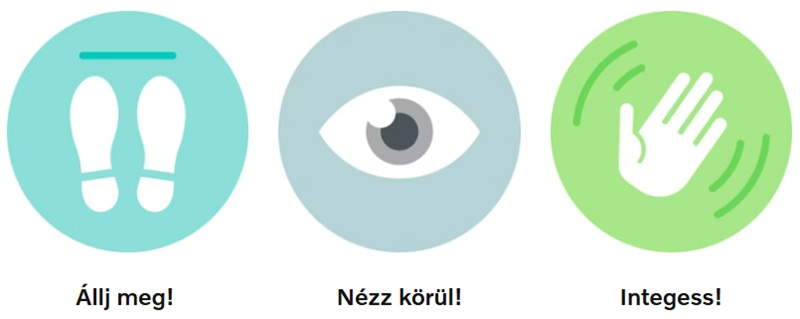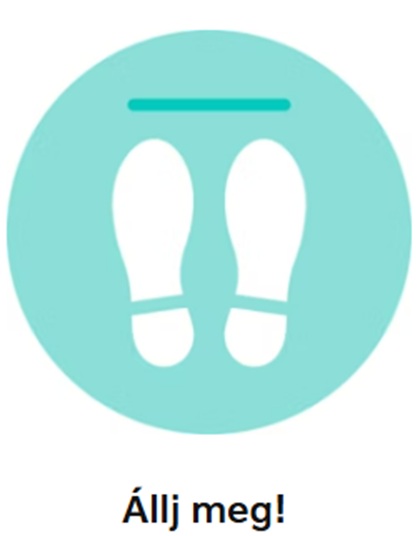
You're not always right you know.
But sometimes you're amusing.
And we're back!
This means "stop, look around, wave":

The simplest way to learn Hungarian is to look at a sentence, or hear a sentence, and say:
What's this mean?
What do we get.
A clear concept.
Or a puzzle,
feeling close
fingers touching the page
the way the paper feels
the heaviness of the book
the texture of the cover
the shininess of a picture
and the way the forms form
- those are letters of the alphabet aren't they.
They make sounds don't they -
we can at least make meaning in the way of sounds -
this letter sounds thisly, and that letter sounds thusly
and the punctuation at least tells us when to break.
But what's it mean?
Well perhaps this means this and that means that.
And so it goes.
It's really not so terrible a thing.
Or walking with a friend and seeing a hand-made sign stapled to a pole.
And there is that question again.
What does it mean?
And here is the wind,
The warmth of the scarf
The finger tracing letters
The mysterious person who posted
What was their life like,
is like.
How old is the sign.
How many months has it stood here in the weather?
But what did they want to say?
Perhaps they were this and that sort of a person.
Perhaps they wanted this and that.
A meaning has all sorts of layers.
If a bunch of text or a bunch of chatter means nothing,
then it means worse than nothing.
Emptiness is actually a beautiful thing. Emptiness is relaxing. Emptiness is peaceful enough to understand.
But if something means nothing - no emotion, no wonder, no humor, no warmth, no curiosity...
a destructive thing happens.
A kind of false understanding happens.
Just because we will ourselves to know, does not mean we can force understanding. It will just build a lie. We have to find out what we do understand, and strengthen that, and from there go onto the next level.
What is context? How is it possible to understand something from context?
The answer is: It is a false understanding. It is not possible to understand something by guessing, unless we have an organized way of tabulating our guesses and checking them against reality, or unless we have some sort of a key. Which means that we must-must-must check after we guess, to see if the rest of the crossword agrees.
Until we do so, it ain't understood.
So, either store away those guessed definitions in a "not certain, still need to verify" portion of the mind, or scribbled in a notebook, or ask someone immediately. Or go check a dictionary.
Try it. Jump in gently after someone says something and say - " [whatever word it is] - what does that mean?"
It's not easy, to ask. Just remembering the sound of the word is a feat. Just admitting "the context is obvious to everyone but me" is a feat. -- Shame!
Try it. Watch people's reaction. They are surprised, aren't they? I am telling you, very few people do this. Few people admit, "excuse me, what the hell does that word mean?"
But try it. It feels good to get an answer. And someone will be happy to answer. Why? Because nobody is bullshitting anyone anymore. We actually for real are wanting to understand. And that feels good.
The definition of "context" is the following: "the environment and situation that a word is used in."
So if we hear that someone got hit by a bat, "bat" might mean two entirely different things depending on if the person was on a baseball field versus in a cave. The meaning of "bat" depends on the context it is used in.
"Some guy got hit by a bat at the baseball game" or "some guy got hit by a bat in the cave" will mean nothing if we do not already know the many definitions for "bat."
That is all that context is. It means that when we are choosing among a word's many definitions, we choose one that is appropriate from among the many definitions we already know. The definition of "context" is not "a situation that allows a person to understand a word the person did not understand before."
Get this straight: we are watching a baseball game. We see a guy get hit by a stick and someone says "he got hit by a bat." Someone has just labeled the upsetting thing we just saw, so we understand. But that isn't context! That is someone labeling an object for us.
We are in a dark cave, and there are flying rodents all around us. We see one fly into a guy and someone says "he got hit by a bat." Again, someone just labeled the fluttering object that we did not have a name for.
Labeling an object is defining it.
Mom hands baby a banana and says "banana." That is definition, not context.
Mom grabs baby and says "let's go!" That is definition, not context.
So let's not be ungrateful when someone defines things. Let's enjoy definitions. We might need to read ahead a few sentences to find a definition, maybe someone refers back to something they said earlier and labels it. We might need to pick out smaller words or word parts that we do know to see if they compound. We might need to see if a word accompanies a certain action or object each time it is mentioned. We have to be aware of labels and definitions that people are giving us as they speak.
If the material does not label or define it, if we do not experience the sound, feeling, taste, shape or motion of it, we will not be able to figure it out. It will have context! However context is just babble if nothing is defining the words we don't understand.
The next lesson will hopefully demonstrate this. Babble babble is nonsense. Only pointing and labeling defines things. Watch:
Watch the following video (feel free to skip to random parts) and answer the following three questions:
Remember
?
Well now we are going to add another helpful word:
Szívesen comes from the word for heart: "szív." So when someone says "szívesen" it means "full-heartedly."
Oddly enough, there isn't any quick "magic word" to memorize and be done with.
"Please" is in the way a person asks for something. The less expectation (for example, by using conditionals), the more polite. The command form is considered a polite form as well. Additionally, any of the forms below are akin to inserting a "please" into whatever you are asking for:
Truly there are many more possibilities as well:
https://gondoljvelem.blogspot.com/2016/08/how-to-be-polite-in-hungarian-chapter-ii.html
Note: It is absolutely impolite to request something with "akarok/akarom," which translates harmlessly enough to "I want" (indefinitely/definitely). Using the word "want" to ask someone for something is on par with the hysterical demand of a spoiled child.
It is fine to use the word "want" to express wants that are not requests. "I want peace" or "I want to see that film one day" is a fine thing to say. "I want a hamburger" is not.Yeah, the following lists of words are quite a lot to learn in one sitting, but these words might be of interest to someone who wants to re-watch the video above. Maybe treat them as a scavenger hunt - not as a list to memorize or anything, just a list to get a sense for the existence and the sounds of a few words, and be aware that Hungarian puts endings on lots of words, and the vowels might shorten or get dropped or transposed in the process:
Here are the numbers one to ten:
Here are some body parts:
Here are some personal endings:
Here are some personal ending examples:
Here are some directions:
Here are some other useful words:
There is one place where it is fun to use context to figure out meaning.
Jokes are built-in Rosetta stones.
Jokes have certain qualities that lend themselves to deciphering:
The whole beauty of a joke is that they take a while to "get" - they are designed to mislead and cause a re-examination of assumptions. A truly clever joke will deliver a punchline at the end that revises the meaning of the beginning.
What the hell, let's review some of the harder concepts from Part I again, so we don't get too cocky. Don't worry, soon enough we will break and have emptiness again.
Simple sentences don't really need to be taught. Beginners can do simple google searches about grammar terms to understand suffixes and vocabulary. But the moment clauses get involved, we are in the deep end.
So where were we last when we were looking at clauses? Ah yes: A clause is a mini sentence, but instead of starting with a capital letter and ending with a period, it lives inside a bigger sentence.
Let's look more closely at examples of the definiteness of the noun (or pronoun).
"I do what I want when I want."
In Hungarian, the sentence would be:
Azt csinálom, amit akarok, és akkor, amikor akarom!
(Definite elements are red; indefinite elements are green.)
If we wanted to write the English sentence Hungarian-style, it would be as follows:
That I do, what I want, and at the time, when I want it!
Hungarian sentences are quite cleverly structured so that each element is clearly given a role. This is so each element can be marked.
A line from a song:
Azt az egyet, ami te vagy, amiben biztos vagy, azt kell megkeresned.
That one, what you are, in what you're sure of, that you have to discover.
In English we wouldn't have all the clauses bracketed like that, so the translation would be more like:
"You have to find out for sure who you are."
But I thought it was fun to show how Hungarian separates each clause from each other, in order for each element to have one role and one role only.
We will not worry about any rules at the moment. Right now we are just saying: notice this idea of definiteness will exist in pretty much every sentence we study. It will become more and more natural as we get used to it. So don't worry about it right now, we will come back to it later, just we mentally have to prepare ourselves as early as possible and develop an awareness of it.

Let's digest this all for now.